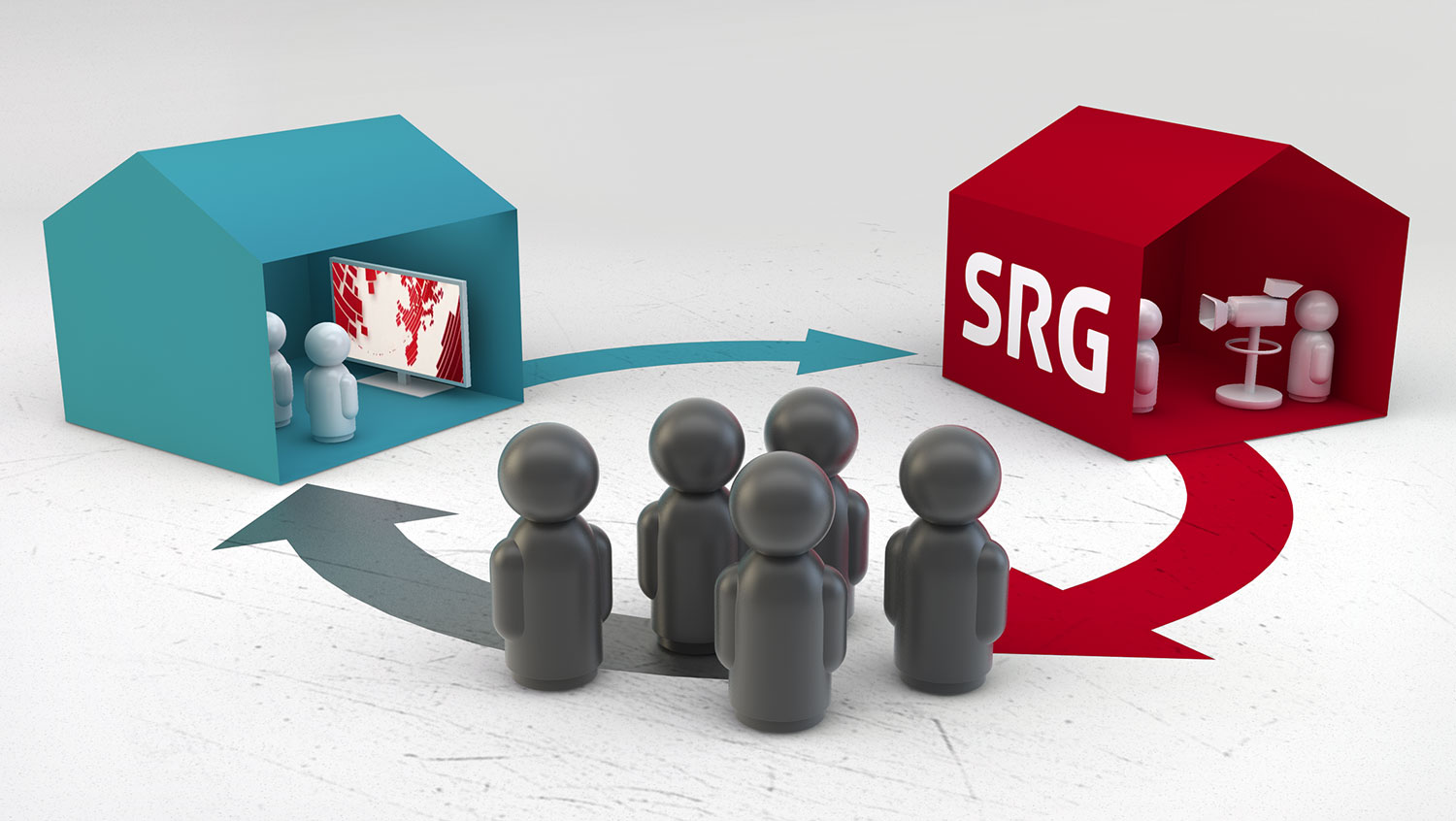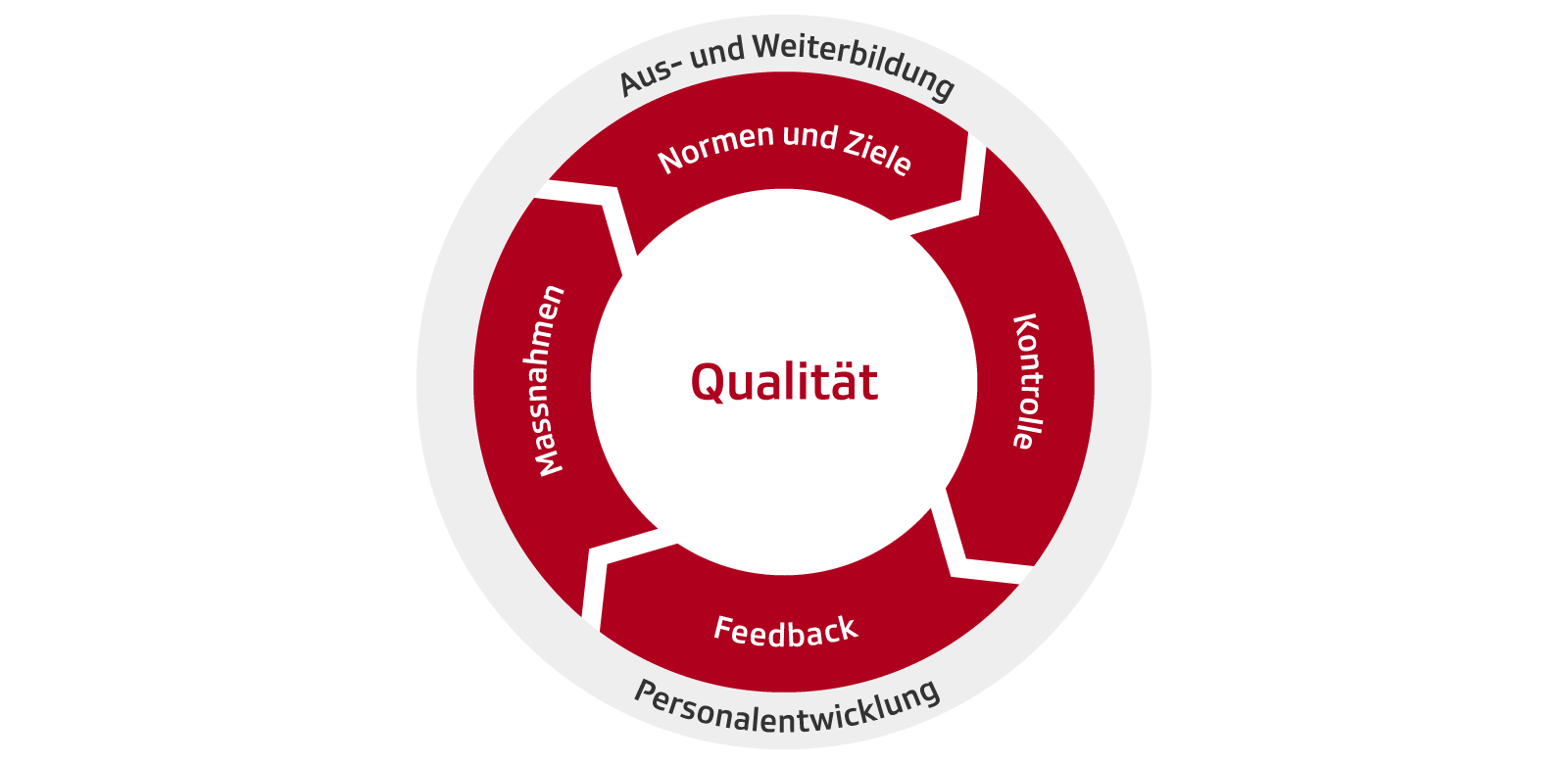Quality assurance
We adhere to the quality and ethical criteria (relevance, professionalism, independence, diversity and accessibility) in accordance with Article 4 of the licence and SRG’s Content and Services Charter. To monitor the way we apply these criteria, we use a circular quality-assurance process comprising four phases.

Quality criteria
People often talk about quality and how important it is. But what does quality mean in relation to SRG’s journalistic products? The licence lays down five central quality criteria.
Relevance
When it comes to selecting the issues and perspectives we cover in our reporting, relevance means giving preference to the universal interest over that of a specific group. Relevant reporting also considers the topicality of the issue in question and its political, economic, cultural and social significance. Geographical or cultural proximity to the everyday world of the public audience can also make an issue relevant.
Professionalism
Professional media work consists in reporting factually and in accordance with ethical standards. This means that in our overall content, all the available key facts and points of view are taken into account and are presented correctly and in a balanced manner. Our objective is to enable audiences to form their own opinion on any given issue. Media professionals are aware of the legal boundaries, and respect the standards of media ethics and the journalistic guidelines even when time is of the essence. The key to journalistic professionalism is training and development.
Independence
Independence means that our media professionals select the topics they cover without regard to government, societal, political or economic interests, and report on those topics impartially and fairly. Where there is a conflict of interest, they step back from covering that particular issue. They conduct research on their own initiative.
Diversity
SRG engages in dialogue with the diverse population groups of 21st-century Switzerland – for example, with all age groups, genders, educational levels and ethnic groups. Our content covers a raft of different genres and formats and reflects a broad range of views.
Accessibility
SRG ensures that its content is available at the points of contact that are relevant for users of our services. The entire population and all members of society should have barrier-free access. Our content covers all four of Switzerland’s official languages. Our programmes and products are presented in a clear, understandable manner, and the SRG archives are accessible to the public.
Quality-assurance system
To comply with the relevant quality criteria, SRG has developed a comprehensive quality-assurance system that consists of four phases. Each phase has its own guidelines and frameworks, which have been drafted for use across SRG.
RSI, RTR, RTS, SRF and SWI are responsible for applying these principles, and for monitoring compliance with them via a central coordination body. The principles are designed to take account of the individual enterprise units’ specific circumstances, which are themselves recorded in supplementary regulations.
Quality Assurance Managers at each of the enterprise units meet regularly as part of the National Specialist Quality Group to share their knowledge and experience of working with quality standards. This group of experts strives to continuously improve quality assurance and aligns its standards to recognised media practices in Switzerland and abroad.
SRG’s quality-assurance system is also subject to regular inspections by external experts, with their key findings being disclosed to the public.

1. Standards and aims
- The context and the principles for all the work SRG does and the organisation’s services are set out in the Federal Act on Radio and Television (RTVG), the SRG licence, SRG’s corporate and content strategy, and its Content and Services Charter. These documents are updated at regular intervals and are published both on the group's intranet and internet, and adopted by the enterprise units.
- RSI, RTR, RTS, SRF and SWI incorporate these documents into their working practices and add to them instructions and rules applying to the specific circumstances of each individual enterprise unit. The documents are updated at regular intervals and are published both on the group’s intranet pages and on the internet.
- All proposals for services within our structure must be described as part of a concept/mandate. This concept/mandate sets out the genre, thematic framework, editorial orientation and component parts of each individual programme or service, as well as quantitative and supplementary performance objectives for the proposed project. The concepts/mandates are updated regularly, and their provisions are binding on editorial staff.
2. Checks
Regular checks are carried out to assess how the standards, norms and objectives are being applied and how external factors are being taken into account.
Editorial staff are responsible for ensuring that quality-control checks are carried out both before and after broadcast/publication. These checks are performed on the basis of the individual enterprise units’ checking procedures, which are themselves updated at regular intervals.
Departments conduct regular and timely checks on the services within their individual remits.
Each enterprise unit conducts regular and timely checks on the services within its individual remit. The enterprise units also produce an annual Quality Report, which focuses on a specific aspect of their service.
3. Feedback
The results of these checks are then communicated to the staff involved and to the public as appropriate, using the following system:
Editorial staff: Quality-control results are discussed at regular meetings. Large editorial teams draft minutes and reports, which are then passed on to the individual staff concerned. External queries are answered in writing as appropriate.
Departments: Quality-control results are discussed at regular meetings. Minutes and reports from these meetings are passed on to all individual staff members concerned. External queries are answered in writing as appropriate.
Directors: Quality-control results are discussed at regular meetings. Minutes and reports are passed on to all individual staff members concerned. External queries are answered in writing as appropriate. At this level, the quality-control procedure includes holding meetings with the relevant editorial teams to communicate the inspection results. The key results of the quality-assurance inspections are communicated to the public in the form of Quality Reports, which are published as part of SRG’s Annual Report.
4. Changes
Following the quality-assurance checks, action is taken to address the findings within the specific areas of the business concerned.
- Standards and aims: The underlying documents (internal standards and broadcast mandates) and the relevant objectives are reviewed and updated as required with a view to implementing any remedial measures that may have been agreed.
- Changes to services: Changes are made to programmes and services on the basis of the inspection results and additional analysis. Key changes are recorded in the Quality Reports, which are in turn incorporated into SRG’s Annual Reports and made available to the public.
5. Initial/ongoing training
- SRG pays special attention to the quality of its employees' training and development by establishing supporting principles and regulations for the entire enterprise. If necessary, RSI, RTR, RTS, SRF and SWI supplement these with more specific regulations that take into account the different needs of the enterprise units. These documents are reviewed regularly, adapted if necessary and published internally.
- New employees receive training on our quality standards and quality-management procedures as part of their initial training, in an adequate form. Interns and those on work experience receive training appropriate to their specific roles.
- Individual requirements for training and development or other HR development measures are discussed annually and recorded in writing. This is done as part of annual appraisal meetings between employees and their line managers. Group training sessions for editorial teams, departments or business units are agreed with the business areas concerned (training, technology etc.) on an ad hoc basis and tied into specific projects. Key training initiatives are recorded in the Quality Reports, which are in turn incorporated into SRG’s Annual Reports and made available to the public.
Quality assurance in the Enterprise Units
The key foundational sources in the day-to-day programming initiated by the enterprise units are the licence, the Content and Services Charter, SRG’s quality-assurance system and the company-specific journalistic guidelines.
RSI
Quality at RSI
Quality is not a subjective factor. It can be ensured by using clearly defined, standardised parameters. At RSI, quality management is ensured by a dedicated department and by continuously monitoring the output. The ‘Quality’ page on rsi.ch gives an overview of the main parameters and guidelines at RSI and examples of the application of the RSI quality-assurance system.
Journalistic Guidelines at RSI
RSI’s journalistic guidelines establish the principles of the Content and Services Charter at operational level. The extensive list of standards is binding on all editors at RSI. It helps to ensure that journalistic quality standards are maintained, media law complied with and media ethics observed.
RTR
Quality at RTR
The ‘RTR Journalistic Quality Management’ statutes cover all tools and processes that RTR uses to fulfil the requirements of the Charter.
Journalistic Guidelines RTR
The licence covers five main aspects of quality at SRG. In addition to those national standards, RTR also operates in accordance with SRF quality criteria and Journalistic Guidelines.
RTS
Quality at RTS
RTS has established the following processes for ensuring journalistic quality.
Journalistic Guidelines at RTS
The Journalistic Guidelines at RTS form the framework for all journalistic activities on radio and television and online. Consequently, the same rules apply to all RTS output, irrespective of the medium.
SRF
Quality at SRF
The section on ‘Quality’ on the srf.ch website gives an overview of the main standards and guidelines by which SRF operates. There is also a description of the SRF quality-management system.
Journalistic Guidelines at SRF
The SRF journalistic guidelines establish the principles of the Content and Services Charter at operational level. The extensive list of standards is binding on all editors at SRF. It helps to ensure that journalistic quality standards are maintained, media law complied with and media ethics observed.
SWI
Quality at SWI
Ongoing product monitoring is conducted to ensure that SWI programmes and content are of the quality specified in the federal Charter. The Statutes for Quality Management are one of the monitoring instruments used.
Journalistic Guidelines at SWI
The licence covers five main aspects of quality at SRG. In addition to those national standards, SWI also operates in accordance with SRF quality criteria and Journalistic Guidelines.
Journalistic Guidelines at SWI (PDF)
Editorial guidelines for dealing with artificial intelligence (AI)
Last updated: July 2025
